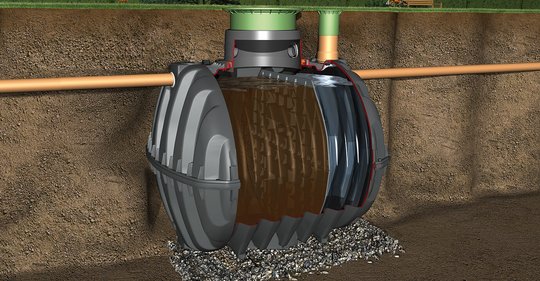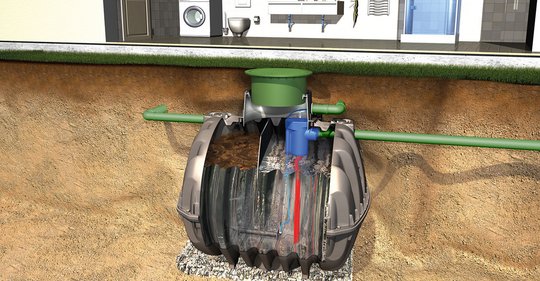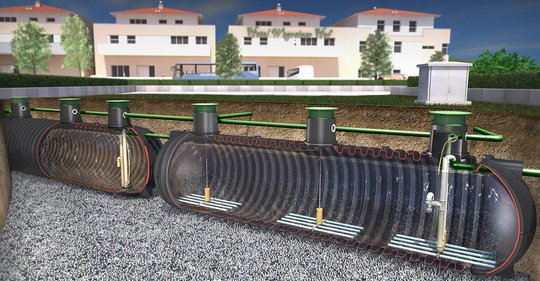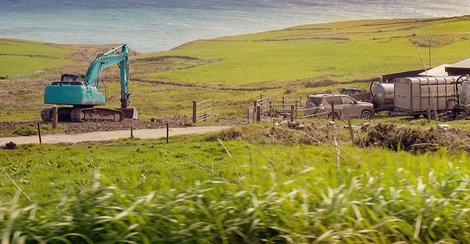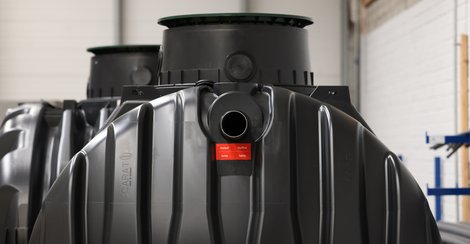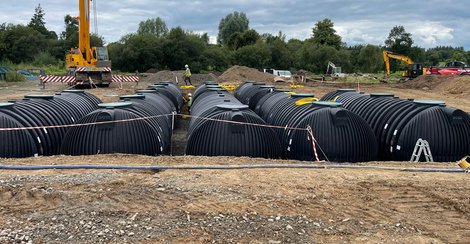Helping Irish homes and businesses install the right wastewater treatment system
Trusted by homeowners and businesses to deliver septic tanks, sewage treatment plants, low-pressure pipe networks, and tertiary filters to effectively treat and safely dispose of wastewater.
Our wastewater treatment systems offer low running costs, high treatment efficiency, and minimal environmental impact, making them a smart choice for long-term reliability.
Fully compliant with EPA and local county council regulations, they are quick and easy to install even on sites with limited budgets, restricted space, or challenging ground conditions.
Find the right solution for your project
Join 1.5M+ customers worldwide using GRAF wastewater treatment systems.

✓ 15-year warranty on your wastewater tank.

✓ 3-year warranty on your SBR technology.

✓ Manufactured using 100% recycled material.

✓ Fully certified to EN12566–PIA approved.
Find the right solution for your project
The Self-Builders Essential Guide

Choosing the wrong system could cost you an extra €10,000, and most homeowners don’t realise until it’s too late.
Inside, you'll discover how to:
✓ Understand the EPA Site Suitability Assessment.
✓ Calculate the right size system for your property.
✓ Compare different types of septic tank systems.
✓ Reduce hidden long-term costs.
✓ Follow a simple step-by-step checklist.
What our customers say

"GRAF Ireland designed and commissioned a treatment plant for our activity centre. At all times we have found them to be extremely professional in dealing with our queries"
-Oliver Hart, Co.Cork

"We have worked with GRAF Ireland on several projects in the last number of years. We have found that the team are extremely helpful and knowledgeable."
-Pat Gleasure, Co.Cork

“I have found GRAF Ireland to be reliable, efficient & professional in their advice and all aspects of their service from quotation to installation”
-Kevin Murphy, Co.Cork
Learn more about septic tank replacements and new installations
Our systems are designed for quick and easy installation, making them perfect for both new and existing developments.
Explore helpful articles
Frequently asked questions
-
How much does a septic tank cost in Ireland?
A standard septic tank for a typical 3–6 bedroom house costs €1,265+VAT. If you require a full sewage treatment plant with aeration, a control panel, and sometimes a pump, prices start at around €2,300+VAT.
You’ll also need to factor in the cost of the percolation area, which depends on the space you have and the ground conditions on site. That part is always site-specific, so we’d need to assess it before giving an exact figure.
-
Can you briefly explain what on-site wastewater treatment systems are?
Wastewater treatment systems handle and treat wastewater from homes, businesses, or properties not connected to a public sewer. They use a tank and a treatment process to remove harmful contaminants. After treatment, clean water is safely released into the environment. It can go through a percolation area, a drainage field, or directly into a stream or river.
Modern septic tanks and wastewater treatment systems aim to reduce hassle for owners. They need little maintenance while ensuring high-quality treated water. This quality is crucial for protecting drinking water, streams, and rivers. These resources are vital for public health and local ecosystems.
-
Who needs to install an on-site wastewater treatment system?
Wastewater treatment systems, like septic tanks and sewage treatment plants, are vital for properties without a main sewer connection. This includes homes, farms, schools, hospitals, hotels, airports, industrial buildings, residential areas, and other businesses in Ireland.
To gain planning permission for new or existing developments, you must safely treat and dispose of your wastewater.
-
How much does it cost to install a septic tank or wastewater treatment system?
The cost of installing a septic tank or wastewater treatment system can differ greatly. For domestic setups, prices usually range from €5,000+VAT to €12,000+VAT. This depends on the tank size, treatment technology, and site conditions.
Commercial systems are often more complex. Their prices can vary widely due to factors like installation scale, required equipment, and any additional work needed.
New build projects are often simpler. They can be designed to fit the property from the start. In contrast, retrofitting systems in existing buildings can bring extra challenges. These may include dealing with limited space, site-specific issues, or upgrading old infrastructure.
In the end, the total cost reflects both the system’s technical needs and the site’s unique conditions.
-
What is the difference between a septic tank and wastewater treatment plant?
Both systems handle the wastewater from your home or business, but they differ in key ways. A septic tank is simple and relies on basic technology. This works well for some locations. However, if ground conditions are poor or space is tight, you need a more advanced secondary wastewater treatment system.
Septic tanks provide "primary" wastewater treatment, while treatment systems offer "secondary" treatment. Secondary systems clean the wastewater to a higher standard. This means your percolation area can be smaller, which helps meet separation distances, EPA guidelines, and local council regulations.
-
What is the difference between a wastewater treatment plant and a sewage treatment plant?
The phrases “wastewater treatment plant” and “sewage treatment plant” are used interchangeably to describe the same type of systems.
-
How do I know if I need a domestic or commercial wastewater treatment system?
Domestic on-site wastewater treatment systems, like septic tanks and treatment plants, work for up to 10PE. Anything above 10PE is seen as commercial. However, exceptions exist. Sometimes, a smaller system suits commercial projects based on specific site conditions.
-
How do I know which type of system is right for my project?
The right septic tank or wastewater treatment system for your project depends on an EPA site suitability assessment. This assessment looks at soil type, percolation rates, and site conditions for domestic projects. For commercial projects, local authorities may require extra tests or approvals.
-
What size on-site wastewater treatment system do I need?
For domestic projects, the number of bedrooms in the house matters. For commercial projects, a more complex calculation is needed for hydraulic and organic loadings. For instance, a 3-bedroom house needs a 5PE wastewater treatment system.
-
What type of percolation area do I need?
An EPA site suitability assessment finds out what type of wastewater treatment system and percolation area a project needs. Domestic projects typically need less testing, but commercial ones may need extra tests to meet local county council rules. Septic tanks often work with traditional gravity trenches. These trenches need the most space for effective percolation and treatment.
On the other hand, wastewater treatment systems are more flexible. They can use gravity trenches, low-pressure pipe networks, or tertiary filters. Tertiary filters are the best option for wastewater treatment. They offer top-notch filtration and environmental protection while needing the least space. This makes them ideal for properties with limited room.
-
Are wastewater treatment systems environmentally friendly?
Our wastewater treatment systems are designed to be energy efficient and protect the environment. They are made from 100% recycled plastic. This helps reduce wastewater pollution and cuts down plastic waste. We also promote a circular economy. By choosing our systems, you make an eco-friendly choice that benefits the planet in many ways.
-
How long does it take to install a septic tank or wastewater treatment system?
For most home projects, installing the on-site wastewater treatment system takes 1 to 3 days. This includes the percolation area. Bigger commercial projects are more complex, so installation takes longer.
-
What are the regulations for installing a wastewater treatment plant in Ireland?
In Ireland, septic tanks and wastewater treatment systems must meet EN12566 certification, the EPA Code of Practice 2021, S.R. 66:2015, and the Building Regulations Technical Guidance Document H. Your wastewater tank and percolation area must be installed as stated in your site assessment and planning application. This ensures compliance with your local county council's requirements.
For commercial projects, you may need a discharge licence. These installations usually involve engineers collaborating with the local authority during planning to ensure compliance with all relevant guidelines and regulations.


